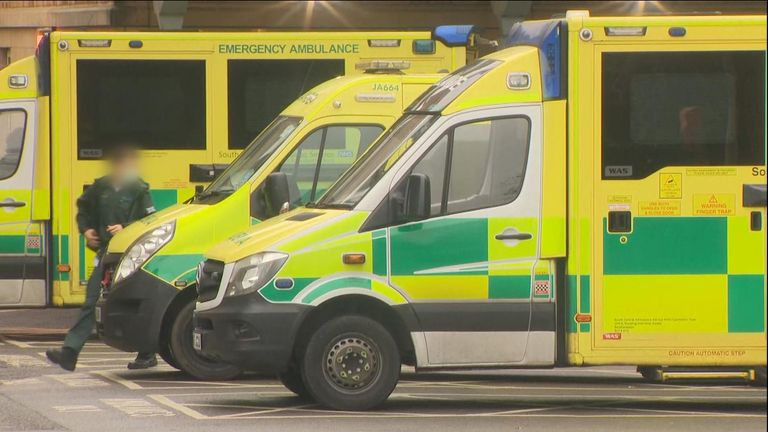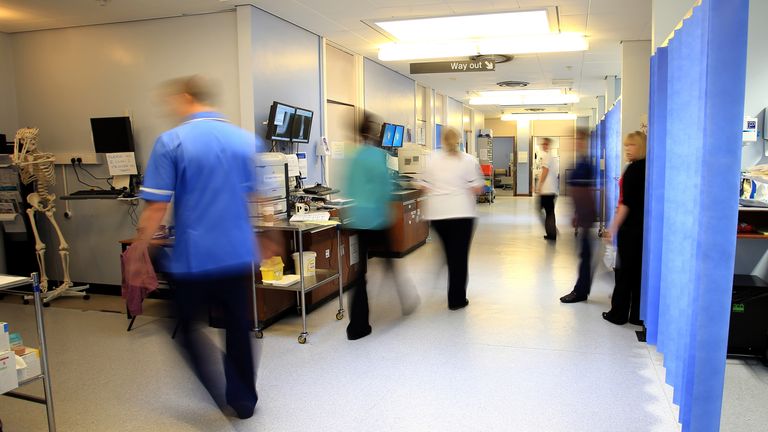A&E waits: Hundreds of patients a week in England may have died unnecessarily
A study found there was likely an excess death for every 72 patients who spent eight to 12 hours in A&E. Nurses say the "crisis" is "taking lives".
Monday 1 April 2024 14:35, UK
More than 250 patients a week in England may have died unnecessarily last year due to very long waits for a bed in A&E, new estimates suggest.
A study by the Royal College of Emergency Medicine (RCEM) suggests patients are put at risk by spending hours in A&E, particularly after a decision has been made to admit them.
The NHS recovery plan set a target in March for 76% of patients attending A&E to be admitted, transferred or discharged within four hours.
But data for the month shows just 70.9% of patients were seen within that time.
In February, the number of people waiting more than 12 hours in A&E departments - from a decision to admit to actually being admitted - was 44,417.
For its new excess death estimates, the RCEM used a study of more than five million NHS patients published in the Emergency Medicine Journal (EMJ) in 2021.
This found there was an excess death for every 72 patients that spent eight to 12 hours in A&E.
The risk of death increased after five hours and got worse with longer waiting times.
In 2022, the RCEM said it believed 300 to 500 excess deaths were likely to have occurred in England each week using this calculation.
But after a Freedom of Information audit of NHS trusts to refine this figure, it found that 65% of people waiting 12 hours or more in A&E are patients waiting for a hospital bed.
NHS data for England shows more than 1.5 million patients waited 12 hours or more in major emergency departments in 2023, meaning more than a million of those were waiting for a bed.
The RCEM has calculated that, when looking solely at patients awaiting admission, an average of 268 excess deaths are likely to have occurred each week in 2023, which is "only 17 fewer than 2022 when applying the same method".
The college added that patients delayed in the back of ambulances, "of which there are thousands", are not included in the figures but are also at risk.
Professor Pat Cullen, general secretary and chief executive of the Royal College of Nurses, said her members reported hospital corridors "packed with patients" and were living with the reality of the new study's findings.
She added: "This crisis is taking lives and nursing staff in England's hospitals are forced to witness it every shift.
"Care is not only undignified but fatally unsafe.
"One nurse told me a lady had died on a trolley in a corridor and it went unnoticed far too long - that is the current state of our health service."
Read more:
'Doctors leaving Wales in their droves'
Health workers to receive one-off payments
Doctors whose lives were devastated by long COVID to sue NHS
Be the first to get Breaking News
Install the Sky News app for free


Dr Adrian Boyle, president of the RCEM, said: "The direct correlation between delays and mortality rates is clear. Patients are being subjected to avoidable harm.
"Urgent intervention is needed to put people first. Patients and staff should not bear the consequences of insufficient funding and under-resourcing.
"We cannot continue to face inequalities in care, avoidable delays and death."
Asked about the figures by Sky News, business minister Kevin Hollinrake pointed to "huge demand-side pressures" - like admissions and attendances at A & E being up 8% year-on-year.
The minister said the "extra demand" was partially down to "demographics", which makes "life difficult in providing health care and social care in our system".
He also blamed strikes in the NHS for the situation in the health service.
Mr Hollinrake said 110,000 more doctors and nurses work in the NHS now when compared to 2010, and said the government has brought in a 13% real-terms increase in funding after inflation over the past five years.
NHS England said hospitals were responding to "significant increases in demand for A&E", with attendance up by 8.6% in February, and emergency admissions up by 7.7%.
It added: "The latest published data shows our urgent and emergency care recovery plan - backed by extra funding with more beds, capacity and greater use of measures like same day emergency care - is delivering improvements, alongside continued work with our colleagues in community and social care to discharge patients when they are medically fit to go home, freeing up beds for other patients.
"The cause of excess deaths is down to several different factors and so it is right that the experts at the ONS - as the executive branch of the stats authority - continue to analyse these causes."
The Department of Health and Social Care added: "We are committed to ensuring people get the emergency care they need, when they need it, and all patients attending A&E are assessed by a doctor or nurse before any treatment takes place, to ensure the most seriously unwell people are treated first.
"We are determined to continue improving experiences for patients and making access to care faster, simpler and fairer.
"We are making progress in reducing A&E waiting times, including adding an extra 5,000 permanent staffed beds this winter to increase capacity and help patients be seen as quickly as possible."







